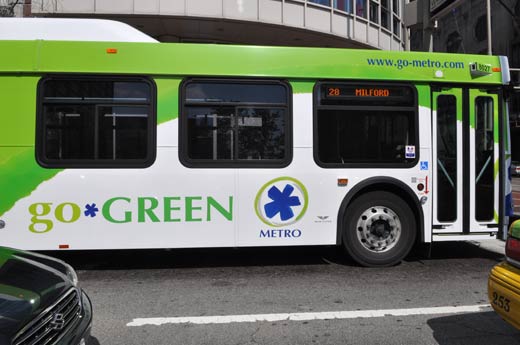
As Cincinnati’s primary transit organization braces for what could be a $12 to $14 million budget shortfall for 2010, the
American Recovery and Reinvestment Act is providing much needed money for capital projects that will keep Metro running.
One of the primary reasons behind the budget deficit for
Metro is the declining earnings tax revenue for the City of Cincinnati which funds nearly half of Metro’s operating budget. Officials at Metro attribute the budget shortfall to the ongoing recession and high unemployment numbers.
As a result, Metro has been forced to propose service reductions, defer $700,000 in capital replacement costs and reduce an additional $400,000 in internal costs just to balance the remaining 2009 budget. In addition to these actions, officials at Metro say that stimulus money has “saved” service and provided $4.2 million for preventive maintenance.
Last week, Congressman
Steve Driehaus (D, OH-1) announced another $823,000 for the cash-strapped transit agency that will be used to purchase three, forty-foot replacement biodiesel buses.
Congressman Driehaus stated that this is a smart investment in public transportation and that “this funding will help SORTA expand access to transportation for riders in greater Cincinnati while replacing aging equipment with new, environmentally friendly buses.”
Officials at Metro emphasize that while budget issues loom, capital projects are still needed and. fortunately, still maintained to a certain extent thanks to stimulus funding and other grants. These capital expenditures also include money for a new CAD/AVL system and capitalized maintenance costs.
Metro is concerned about the 2010 budget warning that the one-time cost savings used in 2009 will not be available next year. “Without new revenue, we will be forced to significantly reduce service in 2010 to balance the budget,” warns Metro CEO Marilyn Shazor.
Other transit systems across the nation are facing similar challenges with dozens of agencies facing service reductions, fare increases or even both.
Metro currently employees 925 people, most of whom are directly responsible for transit operations. Metro provides 22 million rides per year in the Cincinnati region which translates to over 13 million miles of annual travel.
Writer:
Randy A. SimesPhotography by Scott Beseler
Enjoy this story?
Sign up for free solutions-based reporting in your inbox each week.